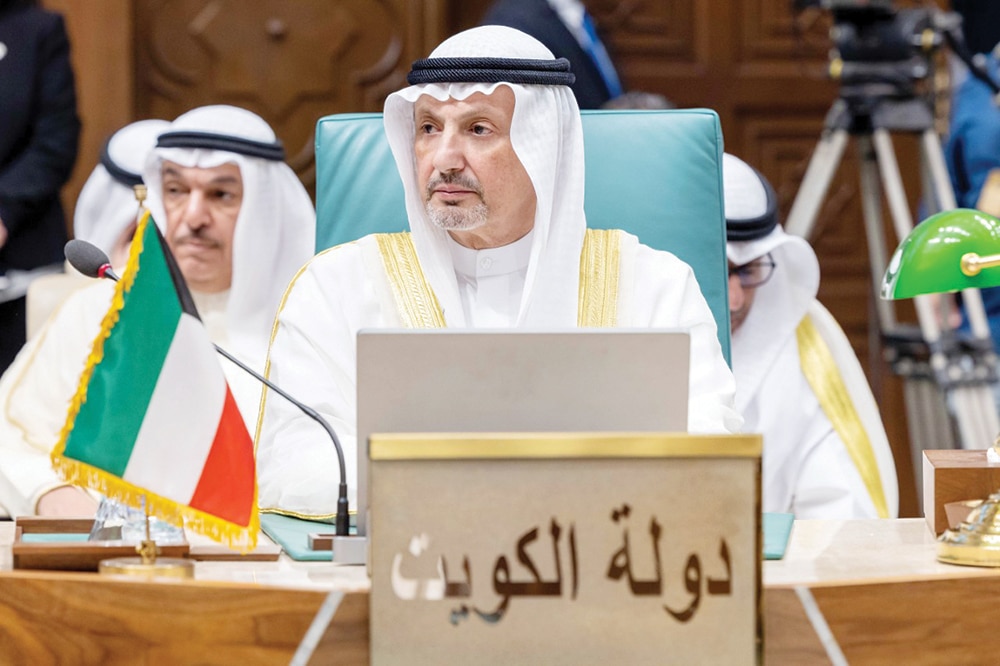CAIRO: The Arab League on Sunday welcomed back Syria’s government, ending a more than decade-long suspension and securing President Bashar Al-Assad’s return to the Arab fold after years of isolation. In Nov 2011, the body suspended Damascus over its crackdown on peaceful protests which began earlier that year and which spiraled into a conflict that has killed more than 500,000 people, displaced millions and battered the country’s infrastructure and industry.
While the frontlines have mostly quietened, large parts of the country’s north remain outside government control, and no political solution has yet been reached to the 12-year-old conflict. “Government delegations from the Syrian Arab Republic will resume their participation in Arab League meetings” starting Sunday, said a unanimous decision by the group’s foreign ministers.
Arab foreign ministers agreed to allow the Syrian delegation to take part in the Arab League’s meetings in a step showing keenness to resolve the conflict in the fellow Arab country, Kuwait’s Foreign Minister Sheikh Salem Al-Abdullah Al-Sabah said on Sunday. Sheikh Salem revealed that the decision reflected Arab keenness on the unity of Syria and a strong desire to resolve the long conflict. He affirmed that the Syrian government must fulfill its commitment to ensure the safe return of the refugees and the displaced in accordance with UNSC resolutions connected with the matter.
There was a decision to form a ministerial committee grouping Jordan, Saudi Arabia, Iraq, Lebanon, Egypt and the Arab League to implement what was agreed upon during the Amman meeting on Syria, he indicated. He noted that the Amman meeting agreed to continue direct dialogue with the Syrian government to reach a comprehensive solution for Syria based on UNSC resolution 2254. Sheikh Salem indicated the committee would be reporting to the Arab League regularly to provide updates.
He also noted that the Arab foreign ministers’ gathering also touched on developments in Sudan as well as Zionist violations against the Palestinians. The Arab foreign ministers called for respecting Sudanese sovereignty and finding solutions to the crisis in Sudan with the participation of Sudanese and international parties. He affirmed that there were calls to provide urgent humanitarian support to Sudan. He also mentioned Kuwait’s campaign to aid Sudan launched on May 4. On Palestine, Sheikh Salem Al-Sabah said the Arab League had issued a statement regarding the brutal Zionist treatment of Palestinians.
The Arab League statement also expressed solidarity with the Palestinian people on the 75th anniversary of the Nakba, when Zionist militias forced Palestinians off their lands.
He noted the meeting called for supporting all measures to protect Palestinians and their right to worship freely at the Al-Aqsa Mosque as well as churches in Palestine, stressing on the importance of releasing Palestinian prisoners from Zionist jails. The Zionist occupation of Palestinian lands since 1967 should cease as well as the inhumane treatment of the Palestine people, he affirmed.
Assad has been politically isolated since the war began, but recent weeks have seen a flurry of diplomatic activity ahead of an Arab League summit in Saudi Arabia on May 19. The ministers in a statement emphasized their “keenness to launch a leading Arab role in efforts to resolve” the Syria crisis. They agreed to form a ministerial committee to continue “direct dialogue with the Syrian government in order to reach a comprehensive solution”.
Ahmed Aboul Gheit, head of the 22-member Arab League, said the decision “brings the Arab side into communication with the Syrian government for the first time in years, in order to look into all aspects of the problem”. Syria’s return to the body is “the beginning... not the end of the issue”, he added, noting it was up to individual countries to decide whether to resume ties with Damascus.
Following the announcement, Syria’s foreign ministry stressed the importance of “Arab cooperation”, in a statement carried by state news agency SANA. “The next stage requires an effective and constructive Arab approach... based on dialogue, mutual respect and common Arab interests”, it added. Several Arab countries cut ties with Syria early in the conflict, betting on Assad’s demise, while some including Qatar and Saudi Arabia provided support to the Syrian opposition.
The last Arab League summit Assad attended was in 2010, while the opposition attended the pan-Arab group’s summit in Doha in 2013, sparking a furious reaction from Damascus. Aboul Gheit told a press conference Assad was welcome to attend the summit later this month once invited by host Saudi Arabia. Regional capitals have gradually been warming to Assad as he has stubbornly held onto power and clawed back territory lost earlier in the conflict with crucial support from Iran and Russia.
In April, Saudi Foreign Minister Prince Faisal bin Farhan made the first visit to Damascus by an official from the kingdom since the start of the war, days after Syrian Foreign Minister Faisal Mekdad visited Saudi Arabia, also on the first such trip. Mekdad has visited a string of Arab countries in recent weeks in a diplomatic push. On Monday, he attended talks in Amman with foreign ministers from Jordan, Saudi Arabia, Iraq and Egypt to discuss the long-running conflict.
But with foreign forces including from Turkey and the United States still present on Syrian territory, the war is far from over and Assad remains internationally isolated. In northwest Syria’s rebel-held Idlib region, displaced Syrians expressed frustration at the Arab League’s decision. “We were pushed out of our homes,” said Ghassan Yussef, 54. “I ask the Arab rulers: Where are you taking us?” – Agencies










